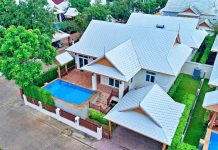The mainland China and Hong Kong commercial real estate markets were standout performers in Asia Pacific last year, and investment activity is likely to remain at least at similar levels in 2016, according to figures from real estate consultancy JLL.
Real estate transaction volumes in Hong Kong climbed 66 percent year-on-year in 2015 to US$12 billion, led by Chinese investors seeking to invest offshore. In the fourth quarter, investment activity doubled to US$4.5 billion, compared with the same period a year ago.
 Real estate transactions in Shanghai rose 87 percent year-on-year in 2015, making it mainland China’s most active market. (Photo/Wikipedia commons)
Real estate transactions in Shanghai rose 87 percent year-on-year in 2015, making it mainland China’s most active market. (Photo/Wikipedia commons)
In mainland China, transaction volumes reached US$10.5 billion in the final quarter of 2015, up 49 percent year-on-year. For the full year, volumes were up 51 percent, setting a new record of RMB179 billion in local currency terms
“Although equities and the renminbi were under pressure, the property investment market was supported by domestic corporates and financial institutions as well as foreign private equity real estate funds,” says Joe Zhou, JLL’s Head of Research in China.
In 2015, Shanghai continued to be China’s most active market with a total of RMB 78.5 billion traded in commercial transactions, rising 87 percent year-on-year to set yet another new record. Volumes have been boosted by large deals such as the sale of Corporate Avenue 1 & 2 for US$1.1 billion. Office property remained the most liquid real estate sector in 2015, accounting for 54.7 percent of overall Shanghai transaction volume.
“Going forward, we do not expect any shortage in availability of funds as China’s domestic players should remain active. There will be more diversity of transactions in terms of asset class, with opportunistic investors seen likely to look for assets such as serviced apartments, residential units and grade B office towers,” says Zhou.
Tier 1 cities such as Shanghai, Beijing and Guangzhou are still expected to outperform many Asia Pacific real estate markets with strong three-year returns of around 10 percent per annum or above, he adds.
In Hong Kong, mainland Chinese corporates will likely remain as active investors in 2016, according to Denis Ma, Head of Research, Hong Kong. “With US interest rates now on the rise, we expect more assets to come to the market as owners seek to capitalise on record high prices and book tidy gains.”
The recent volatility in the Chinese stock market and China’s management of the yuan earlier last month has fuelled market anxiety and led to concerns about the impact on China’s outbound real estate investment. However, JLL’s Zhou says: “contrary to popular belief, devaluing the RMB against the USD may not dampen outbound investment. It will most likely encourage more investment as institutions and individuals become more inclined to park their assets and receive yields in an appreciating currency.”
(Source: JLL Asia Pacific)




